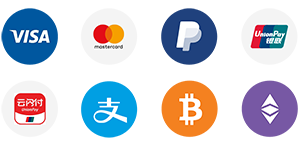The Digital Retail Revolution : Hong Kong’s Journey into E-Commerce Dominance
Thanks to rapid deployment of info technologies among Hong Kong people, online shopping is getting popular as the line between browsing and buying online and offline in Hong Kong is blurring.
As a business consultant in Hong Kong, the discussion about running e-commerce (i.e. to be a e-seller / e-retailer) in Hong Kong is a popular topic among oversea start-ups and SMEs. Right now, we summarize Hong Kong’s background of e-commerce, you may see the pros-and-cons of online retail sectors in the city.
1. Tariff free market
Hong Kong follows free trade policy, Hong Kong government impose customs tariff on very limited items such as wine and tobacco, and import and export licensing are not required except that the items concern public health, safety, security or various international trading policies.
2. Simple and low tax
No VAT and Sales Tax simplifies your business accounting work. Online profits sourced in Hong Kong are subjected to Hong Kong tax, i.e. Income from selling products to overseas market are not taxed in Hong Kong.
3. Lack of dominant online retailers
Although is a mature and open market, Hong Kong’s online retailers of consumer goods are less prevalent than that of other well-developed economies where the mass online retail platforms like the China’s Taobao and the US’s Amazon offer a much greater variety of products that are often cheaper than their offline competitors (e.g. physical stores).
Retail sector of consumer goods is a crowded and highly competitive market in Hong Kong. Take a look at a Hong Kong-based online retailer, HKTVmall, a rapid-growing online retailers covering mass market, it has been operating since 2015 but its online retailing business has made over HK$20 millions loss in 2 years.
4. High population density in urban regions
More than 7 million population is living in the city, most of them are living in urban regions. The land population as mid-2014 stood at 6,690 persons per square kilometre in urban area. People can access to most of consumers goods from physical stores nearby their residential blocks.
It is a headache for every online retailers, they need to develop their selling proposition to compete with offline retailers. In other words, know the reasons of your customers purchasing online when they can buy the same goods from stores downstairs.
5. Tiny living space in average households (high housing cost)
Average floor space for a Hong Kong person is 15 square-meter. However, the size new flats are shrinking drastically because of rocket-high property price. For example, a flat measuring only 12 square-meter (not a typo) are asking for HK$3 millions in urban area. In addition, rental or mortgage repayment absorbed in average 40 per cents of household income.
Hong Kong consumers tend to purchase their daily necessarily in small quantity due to lack of storage space; they highly prefer products with good price-performance ratio to good appearance or design because of their materialistic mindset.
6. Long working hours
Numbers can speak. An average working person in Hong Kong spends 50.11 hours in the workplace per week, while 17.2 days of paid leave are taken per year, according to this survey. Employees have such a long working hours, they are also e-shoppers while at work as browsing and buying online is more alike a hobby or recreational activity in workplace.
7. Minimum Consumer rights protection
Hong Kong benefits from a lack of restrictions from the government where e-commerce is concerned. For example:
- There is no price control in markets;
- Sellers are free to import the most up-to-date goods directly from the factory and their country of origin;
- Sellers are not obligated by Hong Kong laws to adopt return or refund policy. Generally, Hong Kong sellers only offer free exchange of defective items valid for limited days after purchase, and refund is not an option.
8. Loyalty to credit cards, welcome to make direct bank transfer
Credit cards are the dominant online payment methods, people are used to pay by credit card in offline purchase so they prefer it in making online purchase. Hong Kong online sellers must accept VISA and MasterCard, not only they are the major card networks, but also a marketing image of more established business. Apart from them, China UnionPay is ranked the second place.
Other credit cards under American Express, JCB and Diners Club are less commonly accepted since Hong Kong banks are not likely to issues these type of credit cards. The popularity of credit cards in Hong Kong shoppers is also backed by their fond of earning rewards point offered by cards issuers.
Paypal is also widely accepted but some sellers charge top-up fee to customers. Other payment methods like Apple Pay, Google Pay, Samsung Pay, WeChat Pay and Alipay are gathering momentum of growth in Hong Kong, and they are more convenient to customers when they make purchase on their mobile phones.
Direct bank transfer is, surprisingly to overseas sellers, acceptable among Hong Kong shoppers. Hong Kong customers welcome to transfer payment via ATM machines and online banking services. In addition, since Hong Kong bank account for business are difficult to apply for, a merchant owning accounts in Hong Kong bank give extra confidence to customers.
Online sellers must be aware of the banks may charge service fee per transactions. However, sending money from personal accounts to other accounts of the same bank or the same group of bank are free of charge. For example, Hang Seng Bank is a member of HSBC; JETCO has over 20 member banks including Bank of China (HK).
9. Low-cost local postal and couriers
The service is generally low-cost. Take a look at rate card of S.F. Express which the biggest local courier, it charges only HK$22 per shipment within urban area. However, local e-shoppers are not used to purchase add-on shipping insurance for their purchase with local delivery (these standard local delivery services are not covered by insurance), e-sellers should remind the shoppers in case of damage package upon delivery.

![Asia Business Centre (Asia Business Centre (AsiaBC) [HK+SG Bank Account Opening / Company Formation / Company Secretary / Accounting & Tax])](https://asiabc.com.cn/wp-content/uploads/Blog-Banner-The-Digital-Retail-Revolution-Hong-Kongs-Journey-into-E-Commerce-Dominance-1030x464.png)






